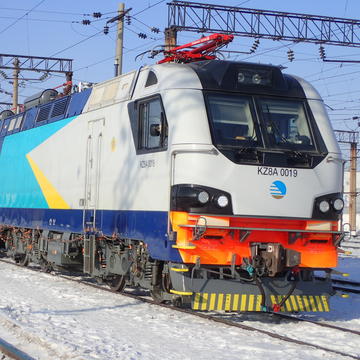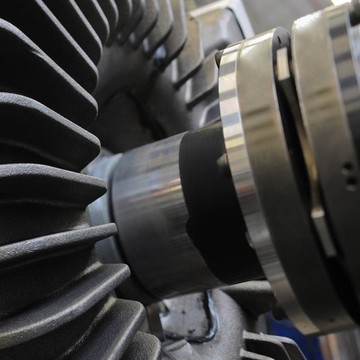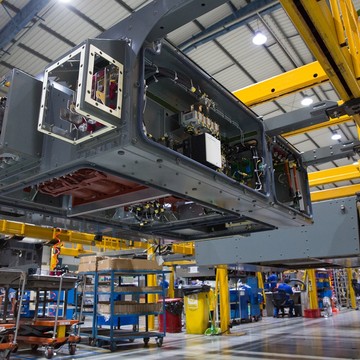Alstom Rolling Stock South Africa

Alstom Rolling Stock South Africa
Alstom Rolling Stock South Africa (ARSSA) is a South African legal entity established in 2014 to deliver locomotives to Transnet Freight Rail (TFR). The company is owned 74% by Alstom and 26% by an Alstom trust participation, or SPV (Special Purpose Vehicle) [1].
ARSSA, a BBBEE (Broad Based Black Economic Empowerment) level 3 company, supports the local rail industry with rail control solutions, product maintenance and services, as well as locomotive and commuter train refurbishment programs. Currently, the company manufactures electric locomotives for TFR. The final assembly of each South African produced locomotive takes place in Durban, KwaZulu Natal province at Transnet Engineering’s (TE) facility. The ARSSA manufacturing plant located in Nigel, is focused on propulsion, producing high-power traction converter systems for the Traxx 3300 platform.
The TFR requirement comprises the design, manufacture and supply of 240 dual voltage electric locomotives, along with supply tools, spares manuals, test equipment and transfer of technology. The requirements also included 60% localisation, supplier development, enterprise development and retaining Level 4 BBBEE.
The 23E Traxx locomotive is fit for purpose to the established South-African practice and construction gauge, and is built in South Africa with more than 60% local content. The locomotive design is characterised by AC 25 kV/50 Hz, DC 3 kV dual voltage, Co'Co’ bogie, 22t Axle load, 3.8 MW traction power. The underframe must allow pulling extra-long and heavy trains in multiple unit operation. The locomotive includes derailment protection, and is designed for speeds of up to 100 km/h.

Industrial organisation
ARSSA’s industrial organisation is made up of:
- Alstom's Mitrac Propulsion factory manufacturing the traction converters in Nigel,
- the carbody shell manufacturing site in Boksburg, and
- the final assembly in Durban, co-executed with Transnet Engineering.
The offshore scope is executed in Kassel and Mannheim, Germany.
Supply Chain
The operations are supported by an extensive South African supply chain established by ARSSA. R 300 million were spend on industrialisation, and purchase/upgrade of new plant and machinery to enable local production of components. ARSSA manages a supplier panel of over 100 direct vendors, and over 120 other suppliers support the locomotives build and project operational needs. Over 23 small medium enterprises have emerged and are fully-fledged, quality compliant suppliers of components/services to the locomotives. Suppliers such as ABB SA (Transformers), and IEC Holden (Drives) established facilities specifically for the ARSSA company to fulfil its contract.

Job creation and preservation
Over 2,065 jobs have been created / preserved by ARSSA directly as a staff requirement to fulfill the project requirements as well as ARSSA suppliers of components and/or services to the project.
Over R550m spend towards job creation and/or preservation to date:
- R309 million on job preservation (existing job maintained as a result of the project), and
- R248 million on job creation (new employment since the beginning of the project).
On completion, the locomotives are handed over to TFR for commercial operation with 2 years of warranty supported by the product introduction teams located at the Kimberly and Port Elizabeth depots. To date, the fleet performance has been above contractual agreement with availability averaging 98%[2] and reliability averaging 1.3 faults per million kilometers. The Traxx locomotive fleet cumulates over 22 million kilometers.
[1] The SPV is made up 23% Employee Share Ownership Scheme (ESOP) and 77% by local shareholders through a Broad-Based Ownership scheme (BBOS).
[2] Contract requires 95%




